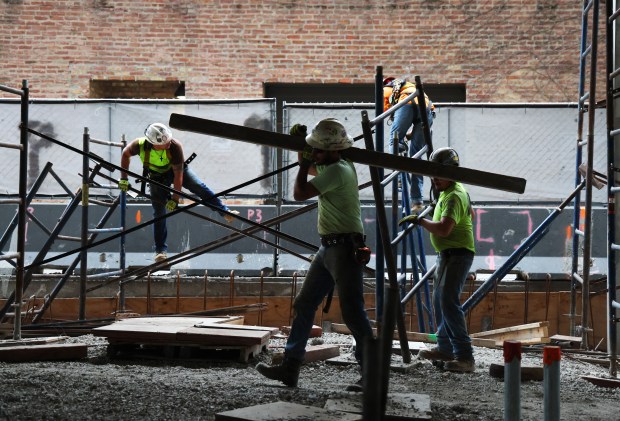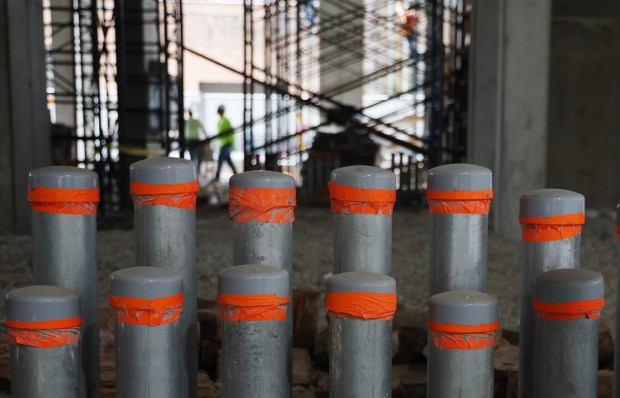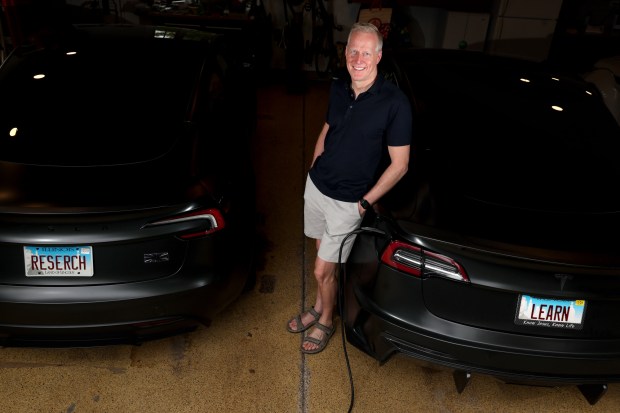James Valentine has owned a Tesla since 2018, and he recently purchased a second one.
He charges the vehicles a few times a week and plugs one in overnight when he has to commute the next day, so wiring his Kildeer home to support EV charging was a no-brainer.
But when Valentine moved to Libertyville last year, he felt comfortable buying a home without charging capability. Having been through the installation process before, Valentine was confident he could have his new home outfitted as well.
Valentine isn’t alone.
Although a new Illinois law went into effect seven months ago requiring all new homes and multifamily apartments to be equipped with EV-capable parking spaces, home charging stations aren’t yet an essential feature for many potential homebuyers or renters.
Developers and realtors say that most homebuyers and renters are only interested in electric vehicle chargers if they already own an EV, which is a small percentage of drivers. But many in the real estate industry are still incorporating charging capability into their marketing, seeing the potential for it to become a more valuable amenity in the future. When Valentine put his Kildeer home up for sale, his realtor recommended that the property’s EV charging capability be advertised in the listing.
The Illinois Electric Vehicle Charging Act, which went into effect Jan. 1, requires developers to provide an EV-capable parking space at new single-family homes and for certain small multifamily units. It also requires them to make all parking spaces at newly constructed or renovated large multifamily buildings EV-capable.
The law defines EV capability as including both the electric panel capacity and conduit to support a level two EV charging station. Homebuyers and tenants still have to request installation of the charger itself.
Illinois is ahead of many states when it comes to installing public EV stations, with about 3,616 public charging ports, according to U.S. Department of Energy data. But it lags behind more populous states like California, which has 46,457 ports, and New York, with 12,632.
But electric vehicle sales have been slowing down recently. U.S. EV sales fell 15.2% in the first quarter of 2024 when compared with the final quarter of 2023, according to data from the Kelley Blue Book.
Valentine sees the benefits of purchasing a home already ready for EV charging.
“I think there’s a lot of uncertainty about car charging at home. Having a house that already has one, it eliminates all of that,” he said.
“I wouldn’t have bought an electric vehicle if I wasn’t going to get the home charger,” Valentine said.
EV charging used as a ‘selling point’
Cody Horvat, a broker at Compass Real Estate in Lincoln Park, said he has advertised EV capability while showing homes to potential buyers. He thinks charging capability could make the difference in choosing between two similar homes, especially at lower price points.
“(If) you own an electric vehicle, you’re probably going to go with the one that has that electric hookup,” Horvat said.
But he said he’s only had one buyer with an electric vehicle who needed a charger, and they installed it on their own after purchasing the home.
Jason Stratton, partner and real estate broker at Klopas Stratton, does most of his business in areas like Bucktown and Wicker Park. In his experience, at most around one out of 20 residents in those areas will have an electric vehicle.
Stratton said he doesn’t think charging capability makes much of a difference to homebuyers.
“I’ve never lost a sale on a house because someone has multiple EVs and there’s not an EV charger in the house,” he said. “It’s super easy to add (the conduit and charger).
Realtors say there’s less access to charging at large multifamily properties. Horvat said brokers in his office previously had to search for apartments that specifically offered the amenity.
But under the new law, tenants will have the right to request an EV charger be installed, within reason.
“It becomes less of an issue … because they’re allowed to install their own charging system,” Horvat said.
Home builders and developers are complying

At large multifamily apartments, having access to at-home charging is a “huge selling point” for potential renters, said Alison Mills, vice president of design and development at CRG. But the Illinois law presents a downside for multifamily developers: It will likely dramatically increase the costs of developing parking, Mills said.
CRG, a national developer of multifamily and student housing headquartered in Chicago, is currently building a 29-story apartment tower at 220 N. Ada St. in Fulton Market. The development is a joint venture involving Shapack, CRG and KMW Communities Development.
Several level-three high-speed chargers will be installed at the property, each of which cost between $25,000 to $30,000, Mills said. Charging capability will be offered in about 20% of the 115 parking spots available for residents at the Ada Street property, which had permits issued before the new law took effect.
“Previously, when we were talking about future-proofing, many developers committed to 20% of the spaces,” Mills said. “That was pretty standard, especially in downtown Chicago.”
For future developments in Illinois, CRG will be required to include EV capability in 100% of its residential parking spots. Mills said complying with the law will quadruple the previous direct costs for CRG to build residential parking.

She also said CRG will likely have to spend “far more” in indirect costs, including reconfiguring electrical rooms and losing space for other amenities.
Those costs may have a bigger impact on smaller, more cost-sensitive projects — such as apartment buildings in the suburbs — causing tenants to pay higher rents or even making some projects no longer possible, Mills said.
Meanwhile, single-family home builders haven’t experienced much change under the law.
Jeff Benach, principal of Lexington Homes, said the company had already been including EV charging capability in all of its homes for three or four years. After construction, Lexington will install chargers upon request for $680.
He said most single-family builders, especially in the suburbs, have been doing the same.
“(If) you wire all the units right off the bat … It’s not that costly,” he said.
Lexington recently sold 36 townhomes at its newly constructed Morton Grove community. Benach said only one or two of those homebuyers requested an EV charger.
He said homebuyers’ demand for chargers started to increase a few years ago, but it’s remained fairly steady since then.
“EVs aren’t quite ready for prime time,” Benach said.
But a main reason people might be hesitant to purchase an EV is the difficulty of accessing charging, especially at home. That creates a “chicken-or-the-egg scenario,” said Noah Horesh, Energy Institute researcher at Colorado State University.
He thinks increasing access to residential charging, like Illinois’ legislation has, will encourage electric vehicle adoption.
“Putting infrastructure in place first is best, in terms of just getting the ball rolling,” Horesh said.
Jenny Hellwig is a freelance reporter.




